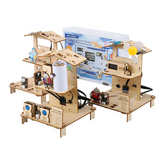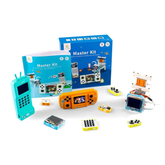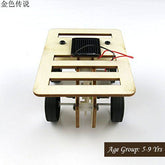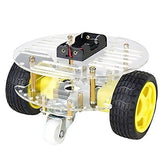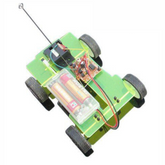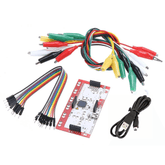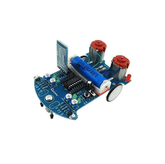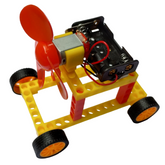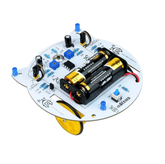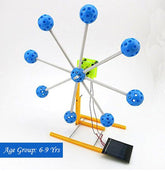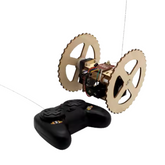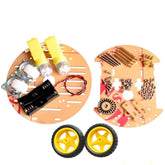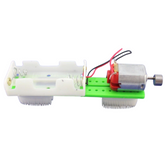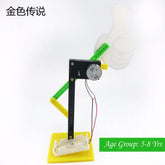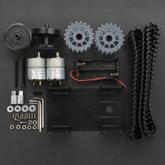-
3-In-1 ACEBOTT ESP32 STEM School Smart Home Education Kit - Level 1 QE0233-In-1 ACEBOTT ESP32 STEM School Smart Home Education Kit - Level 1 QE023 The ACEBOTT STEM School Smart Home Kit Education Solution Series with Teaching Resource for Arduino/ESP32 is ideal for children aged 8 and up who want to learn programming and electronics. It...
- Rs. 7,631
Rs. 8,999- Rs. 7,631
- Unit price
- per
Save Rs. 1,368 -
Elecrow - Crowbits-Master Kit with 3 fully functional products, STEM Programming Educational BuildingElecrow - Crowbits-Master Kit with 3 fully functional products, STEM Programming Educational Building Crowbits Master Kit is the ultimate STEM learning kit designed for creators, innovators, and programming enthusiasts. Featuring three exciting applications—radar, mobile phone, and game console - it enables users to build...
- Rs. 16,254
Rs. 24,998- Rs. 16,254
- Unit price
- per
Save Rs. 8,744 -
Pludo Robotic Walking Dog - STEM Toy on Motion & Robotics for Ages 8–11 | Grade 3 to 5Pludo Robotic Walking Dog - STEM Toy on Motion & Robotics for Ages 8–11 | Grade 3 to 5 This Robotic Walking Dog STEM Toy gives children aged 8–11 an exciting opportunity to explore robotics and engineering through hands-on play. Kids can assemble their...
- Rs. 649
Rs. 1,049- Rs. 649
- Unit price
- per
Save Rs. 400 -
Original DIY Paper Foldscope Microscope Basic KitOriginal DIY Paper Foldscope Microscope Basic Kit The deluxe individual kit is designed to allow any curious explorer to perform microscopy experiments anywhere at anytime. This kit includes Foldscope (140x, 2um resolution microscope) in a portable and critical metal case including a plethora of tools...
- Rs. 449
Rs. 599- Rs. 449
- Unit price
- per
Save Rs. 150 -
DIY 4 Wheel Drive Solar Powered Wooden Car KitDIY 4 Wheel Drive Solar Powered Wooden Car Kit Help your kids develop a scientific aptitude in mechanics with a fun-filled yet informative manner. Not only will the kids learn about using solar power, this car kit will also plant the seed of interest...
- Rs. 133
Rs. 199- Rs. 133
- Unit price
- per
Save Rs. 66 -
DIY 2WD Mini Round Robot CarDIY 2WD Mini Round Robot Car This is 2WD mini round robot car and this comes with two pairs of Geared Motors and Wheels. All the products included in this car kit are quality products. The chassis used in this kit is transparent to create...
- Rs. 391
Rs. 599- Rs. 391
- Unit price
- per
Save Rs. 208 -
DIY Mini Battery Powered 4 Wheel Drive CarDIY Mini Battery Powered 4 Wheel Drive Car Don't just buy your kids remote controlled cars, help them build one. This kit will develop skills like assembling the parts, wireless communication, and interfacing of transmitter/Receiver Board. The kids will learn about RF technology and...
- Rs. 399
Rs. 599- Rs. 399
- Unit price
- per
Save Rs. 200 -
Makey MakeyMakey Makey The MaKey MaKey uses high resistance switching to detect when you've made a connection even through materials that aren't very conductive (like leaves, pasta or people). This technique attracts noise on the input, so a moving window averager is used to lowpass...
- Rs. 899
Rs. 1,199- Rs. 899
- Unit price
- per
Save Rs. 300 -
3 in 1 Educational DIY Solar Robot Kit3 in 1 Educational DIY Solar Robot Kit Introducing the Solar Robot Educational Model Building Kit, a fantastic DIY project for kids and adults alike. This innovative kit features three different working models: a robot, scorpion, and tank, all powered by direct sunlight. To...
- Rs. 349
Rs. 499- Rs. 349
- Unit price
- per
Save Rs. 150 -
DIY Creeping Tiny GeckoDIY Creeping Tiny Gecko DIY Creeping Tiny Gecko is a handmade DIY creeping gecko technology model puzzle toy, baby DIY parts package, need its own assembly, installation is simple, provide detailed graphic installation instructions, battery-owned, beneficial to young people’s brain development and growth, whether...
- Rs. 345
Rs. 399- Rs. 345
- Unit price
- per
Save Rs. 54 -
DIY Kits D2-6 Bluetooth Remote Control Intelligent CarDIY Kits D2-6 Bluetooth Remote Control Intelligent Car D2-6 Bluetooth Remote Control Intelligent Car 51 MCU DIY Kit is the latest version of the D2 series kit, it has a pre-programmed single-chip microcomputer as the core, through program control achieves tracking, obstacle avoidance, Bluetooth...
- Rs. 699
Rs. 999- Rs. 699
- Unit price
- per
Save Rs. 300 -
Spider Robot Insect Fun ToySpider Robot Insect Fun Toy This solar spider when exposed to sunlight can start its mini-engine by shaking itself, so no batteries are needed. Powered by sunlight, this product will shake itself, seemingly forward or backward, spinning around as if looking for food. Both specially designed and eco-friendly,...
- Rs. 349
Rs. 399- Rs. 349
- Unit price
- per
Save Rs. 50 -
DIY Colorful Wind Generator CarDIY Colorful Wind Generator Car DIY Colorful Wind Generator Car Model is an Educational Self-assembling Plastic Science Physical Experiments Toy Kit for Kids. It not only guides children to understand scientific principles but also improves children's hands-on ability in the process of self-assembly. Note: This...
- Rs. 299
Rs. 446- Rs. 299
- Unit price
- per
Save Rs. 147 -
DIY Mini Cat Tracking RobotDIY Mini Cat Tracking Robot Build your DIY Mini Cat Tracking Robot. This mini Cat face-shaped robot setup comes with a line follower map as all required Assembly guide to build the robot. This robot runs on a 3V DC supply which can be...
- Rs. 575
Rs. 863- Rs. 575
- Unit price
- per
Save Rs. 288 -
DIY Solar Powered Ferris Wheel KitDIY Solar Powered Ferris Wheel Kit Along with teaching your kid about assembly, motors and batteries, add a perfect showpiece of your kid's invention at your home! Learn to harness the power of solar to ferry the wheel which can be converted into a...
- Rs. 614
Rs. 799- Rs. 614
- Unit price
- per
Save Rs. 185 -
DIY 2 Wheeler Remote Controlled CarDIY 2 Wheeler Remote Controlled Car Fun remote control two-wheeler is an original technology small production car. After the required kit is assembled, the two wheels of the remote control forward and reverse to achieve forward, backward, turn and rotate in situ and other...
- Rs. 899
Rs. 1,228- Rs. 899
- Unit price
- per
Save Rs. 329 -
DIY 2WD Smart Chassis Car KitDIY 2WD Smart Chassis Car Kit Simple Structure, easy to assemble and use, reasonable design, reserve interface for tracking module. speed module, driver module, and obstacle avoidance module Four on the 5th battery compartment, convenient power throughout the system in a switch, while starting...
- Rs. 391
Rs. 599- Rs. 391
- Unit price
- per
Save Rs. 208 -
RC Brush Car No.1 Model Kit DIY Scientific Toys for Science Training.RC Brush Car No.1 Model Kit DIY Scientific Toys for Science Training. Bicycles, electric cars, motorcycles, cars. All these cars have wheels. Have you ever seen a car that can run without wheels? In fact, cars don't have to have wheels! You don't believe...
- Rs. 150
Rs. 222- Rs. 150
- Unit price
- per
Save Rs. 72 -
DIY Small Inventions Student Science Experiment Creative GiftDIY Small Inventions Student Science Experiment Creative Gift A great gift for your kid to explore his creative side and learn about the concept of assembling and batteries in this awesome kit. This is a display of conversion of motion within a system through...
- Rs. 299
Rs. 349- Rs. 299
- Unit price
- per
Save Rs. 50 -
Black Gladiator - Tracked Robot ChassisBlack Gladiator - Tracked Robot Chassis Black Gladiator-Tracked Robot Chassis is your ideal solution for agile and easy-to-control robotics projects. This Arduino-compatible chassis boasts a high-strength aluminum alloy base, delivering stability and durability. The engineering plastic tracks ensure good elasticity and road grip, making...
- Rs. 2,849
Rs. 4,999- Rs. 2,849
- Unit price
- per
Save Rs. 2,150

Best Price Guarantee

Ready Stock for Bulk Purchase

Dedicated Account Managers

5% GST Benefits for Eligible SEZ and Edu

Technical Support Available

1-Year Manufacturer Warranty



